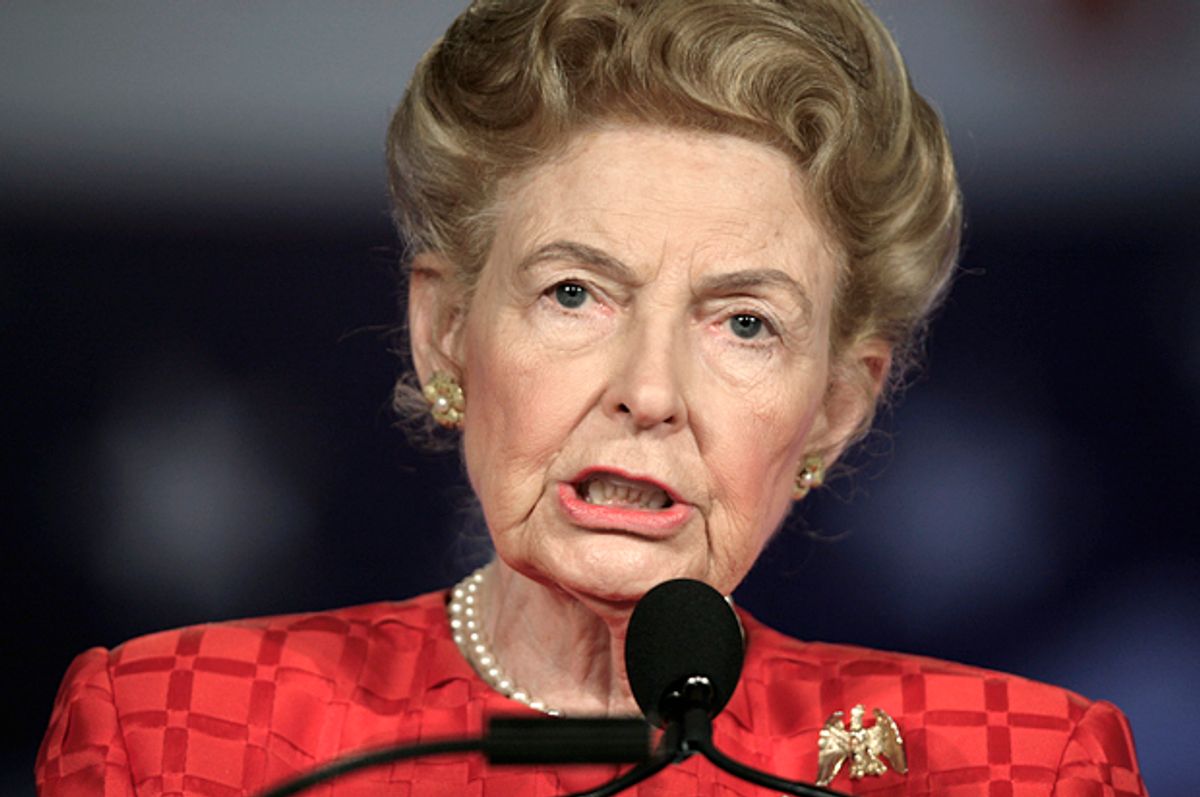On Monday evening, I was exactly as sorry to hear of the demise of Phyllis Schlafly as I previously had been about Margaret Thatcher's and Antonin Scalia's. Which is to say, not at all. But I don't exactly feel like going out and celebrating it either.
When a person who spent an entire public life devoted to thwarting the progress of others dies, it may be tempting to assume, as someone noted on Twitter Monday, that hell now has a new demon. And the 92-year-old conservative writer and founder of the Eagle Forum who helped torpedo the Equal Rights Amendment 40 years ago went down swinging, railing against transgender rights in a column posted just last week.
This was a woman who in the year of our Lord 2015 still insisted that "Women like to marry a man who makes more than she does, so then she can take time off and work fewer hours when she has something she’d rather do like have a kid and look after her children. So the pay gap, really, is something that women like." Not even the 1992 admission by her own son John — who continued to support and work with his mom, by the way — that he was gay slowed down her hate-mongering agenda one iota. Last year she told writer and advocate Michelangelo Signorile that "The gays have their argument about inevitability. I don’t think that’s so." And back in the '90s, she referred to her son's outing as "a deliberate strike at me," saying, "It just shows how hateful those people are."
Schlafly was no stranger to the word "hateful." She endorsed Donald Trump largely on the strength of his anti-Muslim rhetoric, complaining that too many European nations have "let these Muslims overrun their country." In 2007, she told women that "By getting married, the woman has consented to sex, and I don't think you can call it rape." Decades earlier, she explained to them that "Sexual harassment on the job is not a problem for the virtuous woman except in the rarest of cases." She was, for the better part of a century, a person who put her time and energy into fighting reproductive rights, LGBT rights, and basic sex education, calling it "like in-home sales parties for abortions." She was a world-class troll who enjoyed saying explosive things with little to no regard for anyone her comments would offend. In her obituary, the New York Times understatedly referred to her as "polarizing." These are the facts of her life. These are the choices she made. This is the legacy she worked very hard to leave behind.
Also left behind, however, are six children, 16 grandchildren and three great-grandchildren. Schlafly had a family that knew her as something other than that mean lady from the news. They have a right to grieve her as a mother and a human being. And death, by the way, is not karmic retribution, not for anyone. We all meet the same fate eventually. That's why it was unbecoming five years ago when so-called Christians crowed about Christopher Hitchens dying of cancer, and it's just as futile now when people who allegedly champion love and tolerance express glee at a very old lady finally, as one writer put it on social media, "shutting up."
Death does not forgive a person's grotesque behavior in life. Margaret Thatcher was not a feminist icon and Schlafly was not, as Republican National Committee Chairman Reince Priebus called her Monday, "a courageous pioneer." It's not "courageous" to declare that transgender rights will "turn our boys into peeping Toms." She was a coward and a bully and history will remember her as such. But treating an inevitable consequence of living as a cause for celebration, laughing off another human being's demise — these things don't make a person morally superior. And as for me, I'd rather enjoy knowing that in her lifetime, Schlafly got to see marriage equality and a woman become the leading candidate for president of the United States than I could ever care about her death.



Shares